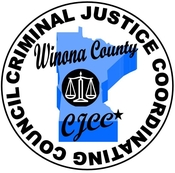
CJCC Structure
The CJCC has five standing committees that meet on a monthly basis to discuss issues related to that committee’s charge. The work of each committee is reported to and acted upon (as needed) by the CJCC Council. The committees and committee charges are as follows:
Ad Hoc Committees: The CJCC has ad-hoc committees that meet on an as-needed basis to address issues or concerns that arise that are not handled through the standing committees.
Standing Committees: The CJCC has five standing committees that meet on a monthly basis to discuss issues related to that committee’s charge. The work of each committee is reported to and acted upon (as needed) by the CJCC Council. The committees and committee charges are as follows:
- Courts: The Courts Committee will search for strategies and procedures that will enable the courts to function more effectively and at reasonable cost to the taxpayer while upholding due process and the rule of law.
- Community Outreach & Diversity: To educate the public about initiatives, programs and services supported by the CJCC; to build an atmosphere of respect and inclusion toward the criminal justice system regardless of culture or background; to identify community concerns that are related to the responsibilities of the CJCC and to prepare a detailed, proactive public relations plan to address those concerns.
- Early Intervention & Prevention: To research, evaluate and recommend community-based programming and services designed to prevent individuals from entering the criminal justice system.
- Jail & Jail Alternatives: The Committee will recommend alternatives to incarceration for the criminal justice system to consider. The Committee will research, evaluate and recommend programming designed to facilitate change in the individual and thus prevent future involvement in the criminal justice process.
- Juvenile Justice: To encourage an effective juvenile justice system that promotes the well-being of youth while holding youth accountable for their actions and promoting public safety.
Workgroups: Each standing committee has a number of workgroups, comprised of relevant stakeholders regarding that issue, who meet on an as-needed basis to recommend changes/improvements to the governing standing committee.
